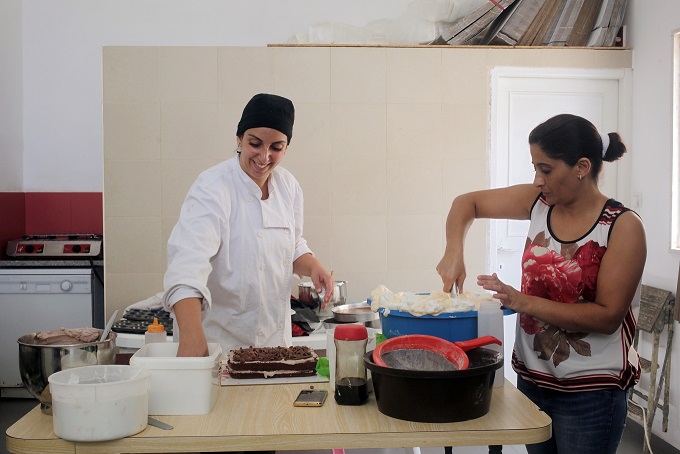
Aleefa, one of the participants in the Cherie Blair Foundation for Women’s Advancing Palestinian Women Entrepreneurs project / Photo by Tamara Hadi
When it comes to women’s economic empowerment, what works? Those of us operating in this vast and complex field know that there are no quick wins or simple fixes. As Professor Linda Scott notes, “Much like it takes a village to raise a child, it takes an ecosystem to empower a woman”.
At the Cherie Blair Foundation for Women, we take a broad approach to our mission to empower women entrepreneurs in developing and emerging economies. Our interventions focus on enabling women to unlock their own power and potential by helping them access a range of crucial skills and tools, from mentoring to mobile technology. Underpinning all of our work, however, is the belief that so-called ‘soft’ skills are absolutely critical to building women’s economic agency.
In addition to providing training on the more practical aspects of running a successful business –things like book-keeping, financial management and marketing – our projects also focus on bolstering those less tangible skills, such as confidence, resilience, problem solving and negotiation. We do this through a range of mechanisms, including face-to-face training, one-to-one mentoring support, inspirational webinars and digital learning.
The international development sector is increasingly grasping the importance of taking a more holistic approach to women’s economic empowerment. In its inaugural and path-breaking 2016 report, Leave No One Behind, the UN’s High Level Panel on Women’s Economic Empowerment stated:
“The most effective vocational training programmes for women often incorporate “soft skills and life skills” development, as well as on-the-job training (internships or apprenticeships). Soft skills, such as communication and leadership skills that are valued on the labour market, are deeply affected by gender norms; investing in such skills can improve women’s self-confidence and job prospects.”
There is a clear demand for this type of support. In the West Bank, we supported over 200 Palestinian women to scale up their businesses. These women are operating in an incredibly difficult environment – in addition to contending with ongoing conflict and political instability, they also face deeply entrenched social attitudes which uphold the idea that a woman’s ‘place’ is firmly in the home. As one of our project trainers put it, “Women here have to prove themselves. They need a steel will to make a successful business.”

Sana (pictured left), one of the participants in the Cherie Blair Foundation for Women’s Advancing Palestinian Women Entrepreneurs project / Photo by Tamara Hadi
Before the project commenced, we conducted some research to get to grips with these issues. Many women spoke to us about the social stigma associated with failure, which meant that any failure – personal or professional – was to be avoided at all costs. Others described the isolation and stress that came with launching a business without the support of their families.
In response, we developed psychosocial training to try and address some of these challenges. This included incorporating activities to enable women to fortify certain personality traits, such as persistence and opportunity seeking, and apply these skills to their own enterprises.
It was telling that demand for the project was high, with 300 applicants competing for 100 spots in the first intake. Nearly all of the women who joined the project reported increased pride and confidence in their abilities as a result of their participation. Networking and peer support played a crucial role in this – having the opportunity to witness the success of other participants instilled greater confidence in the women, inspiring them to persevere with their own goals.
Academic research also shows that ‘soft power’ can be the swing factor to entrepreneurial success. Earlier this year researchers from the World Bank, the National University of Singapore and Leuphana University in Germany tested this ‘mind over matter’ theory through an exercise with 1,500 businesses owners in Togo. The researchers split the businesses into three groups of 500. The first group served as the control; the second received more traditional business training on issues like accounting and financial management; while the final group received training underpinned by psychological research, on skills such as setting goals, dealing with feedback and persistence.
The outcome was fascinating. The psychological training helped boost monthly sales by 17% compared with the control group, while profits rose by 30%. Participants in the third group also seemed to display more evidence of innovation, developing more new products than the control group. Interestingly, the more traditional business training seemed to have no effect at all.
Across the world, people are waking up to the fact that business success isn’t just dependent on being able to balance the books and make a hard sell. But in a world where women face vast barriers to participating safely and freely in the labour market, we must not lose sight of the catalytic role that soft skills can play in the fight for economic equality. In reality, there is nothing ‘soft’ about building the grit and resilience needed to weather the financial and psychological storms that come with being a woman entrepreneur in a man’s world.
